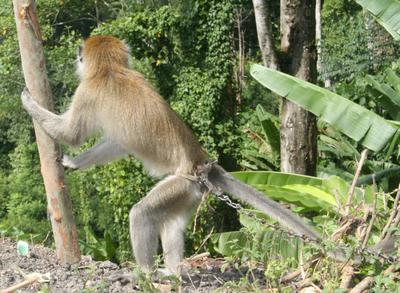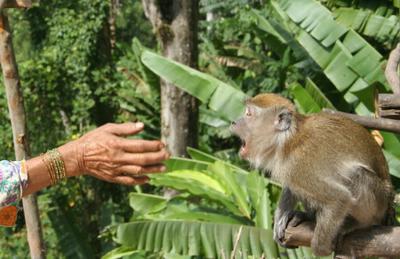Victims of Humans
 This is an article I wrote for The Star, with minor alterations. The photo of the slow loris comes from the Forest Department, Sarawak, Malaysia. I did not have a camera with me on the day in question.
This is an article I wrote for The Star, with minor alterations. The photo of the slow loris comes from the Forest Department, Sarawak, Malaysia. I did not have a camera with me on the day in question.Some older Malays say that slow lorises (kongkang) are bad luck. But for slow lorises, it is human beings who are bad luck, and worse. These slow-moving, nocturnal primates are helpless against human predators.
While on holiday in Cameron Highlands, Pahang in July, I saw an orang asli man sell a pair of slow lorises to a Malay family. I was shocked. I knew I was witnessing something inhumane and tragic. What I did not know was that I was also witnessing a crime.
Some Malaysian friends and I had stopped at an orang asli settlement by the side of the road from Tapah to Ringlet. It was similar to others that lined the way, except that here, in addition to the usual rambutan and wild ginger for sale, there were wild animals on display.
Two long-tailed macaques were chained to a flimsy shelter. Several baby monkeys scrabbled in the dirt amidst a pack of skinny dogs and puppies. A common palm civet (musang) was curled up in a cardboard box on the veranda of the small house, a metal chain slung around its hips.
My friend called my attention to a pair of slow lorises huddled in a rusty wire cage by the side of the house. I could see that these animals were in terrible trouble. Only their backs were visible as they hunkered down, clinging to each other, their fear and misery palpable.
Suddenly, a Malay family drove up. The orang asli swiftly toted the caged slow lorises to their car. My friend, who could understand what was being said, told me: “They just bought them for RM50.” We watched in horror as the men shoved the animals into the boot and the family drove off. It was over in the blink of an eye.
I reported the incident to the Wildlife and National Parks Department (DWNP). What the Pahang DWNP director Zainuddin Abdullah Shukor told me was stunning: The slow loris is totally protected under Malaysian law.
It is possible to get a special permit to catch or keep a totally protected species, but it is not easy. A committee within the DWNP considers such applications and makes a recommendation to the Natural Resources and Environment Minister, who is responsible for the final decision. According to the DWNP, it is extremely unlikely that such a permit would be issued for commercial purposes.
Zainuddin said he would send the Wildlife Crime Unit (WCU) to investigate the site where the sale took place. As the weeks went by with no news, I grew increasingly concerned. I arranged to meet Misliah Mohamed Basir, director of the department’s Law and Enforcement Division. Her office in Cheras, Kuala Lumpur, is cluttered with books on plants and animals and with “trophies” confiscated from the illegal wildlife trade – a cobra in a bottle, a bird of paradise in a glass case.
She confirmed that while the orang asli have the right to use anything in the forest, they do not have the right to sell wildlife without the proper authorisation. But might an exception be made for them because they are often among the nation’s “hard-core poor”?
Misliah bristled at the thought. “We do not give them any special treatment,” she said fiercely. “They may have been ignorant of the law in the past, but not anymore. They’re professionals. If they want to trade in animals, they must get a licence and follow the rules, just like everybody else. And we still would not recommend that they be given a special permit to sell totally protected species.
“The middlemen warn their orang asli suppliers about us. When we show up at their villages, they know who we are and what we’re after. As we go from house to house, they are ready for us, with no animals in sight and with all the right answers.”
As for the slow loris case, Misliah confirmed my fear that there was nothing to be done after the fact. “We have to catch them in the act of selling the animals. Otherwise, it’s just your word against theirs.” She said the DWNP relies on informers to tip them off when animals are being concealed or when a sale is going to take place, for that very reason.
Chris Shepherd, of TRAFFIC South-East Asia, a non-governmental organisation which monitors the wildlife trade in the region, said slow lorises were sold as pets in Malaysia, Indonesia and the Philippines.
“Their captors rip out their teeth with pliers to render them completely defenceless. If the animal doesn’t die of a mouth infection, it still won’t last long in captivity. The buyers have no clue about how to feed them or take care of them. These are wild animals. They should not be kept in someone’s home.”
A TRAFFIC report, Open Season, reveals that slow lorises are commonly available in the markets of Medan, Indonesia, being observed in more than 90% of the survey counts undertaken by TRAFFIC. Some were sold for “medicinal” uses, while most were sold as “tame” pets. Despite being protected under Indonesian law, 692 slow lorises were recorded on sale in Medan’s markets between 1997 and 2001.
“Many wildlife species in Malaysia and the rest of South-East Asia are going to disappear before most people are even aware of their existence,” Shepherd said grimly. “There have got to be more serious penalties for wildlife law violations, not just a slap on the wrist.”
So what is happening in the case I reported? As it turns out, the Perak DWNP has jurisdiction over the area where the sale took place.
“I sent my men to investigate,” says Perak director Shabrina Mohamed Shariff. “All they saw was a chained monkey. The orang asli said that the man who did the trapping was away. They also said the slow lorises you saw were for their own consumption. They denied selling them.”
After suggesting that perhaps I was mistaken about what I had seen, Shabrina admitted that the orang asli might have been lying.
“My men are still in the area. We’re going to monitor the site. We will also ask our informers in the area to be on the alert. But it is difficult to trap slow lorises, so I don’t know how soon we will catch them with any again.”
Maybe the Perak DWNP will catch these particular orang asli red-handed, maybe they will not. The odds are that the pair of slow lorises I saw being sold are already dead, victims of human ignorance and abuse.
I am deeply saddened and more convinced than ever of the importance of reporting suspicious activities with wildlife to the authorities. The DWNP needs all the public help it can get if Malaysia’s endangered species are to have any chance of survival.
I returned a few weeks later to the same site in Cameron Highlands, this time with a camera. The civet was gone, as was one of the adolescent monkeys. The young female monkey above was highly protective of the babies in the area. She was sitting in a pile of trash, digging through it for scraps to eat. When the orang asli woman approached her, she reacted with fear and anger, as you can see. The orang asli said that the "elder brother" who did the trapping was away. Officials of the Department of Wildlife and National Parks told me that although it was unlikely the orang asli had a license to keep and possibly sell the monkeys, it would be better to catch them at something bigger. As for the palm civet? They could get a license to kill it, but not to keep it or sell it. But most people thought of them as pests, anyway, I was told with a shrug. The implication was that the fate of a "pest" wasn't a high priority. Maybe it's a case of choosing your battles.
A young female captive macaque staring at the jungle in Cameron Highlands, taken in July, 2005. Notice the chain around her hips. [Click on picture for larger version]
To report a suspected wildlife law violation, contact:
|
Categories: Animal Welfare, My Articles









0 Comments:
Post a Comment
<< Home